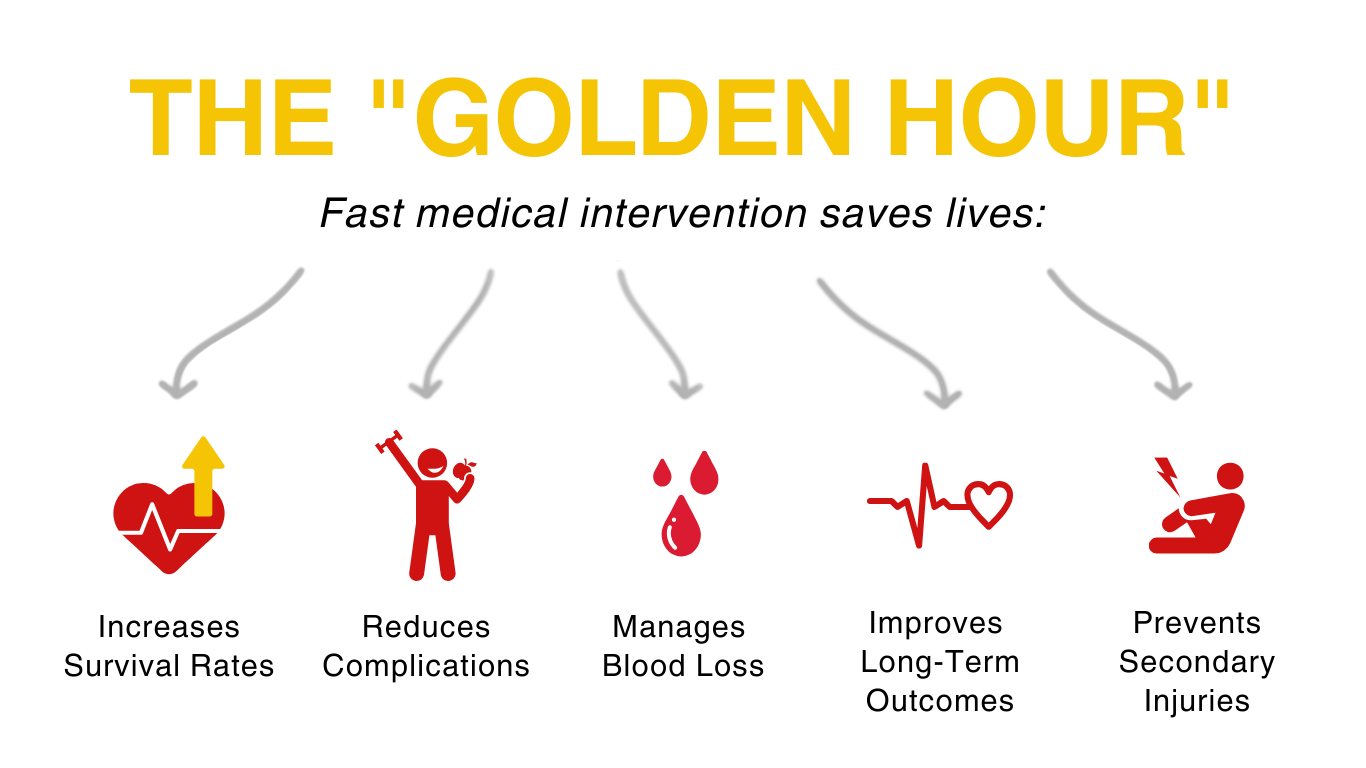
In healthcare, the term “Golden Hour” carries a life-saving significance. Popularized by U.S. military surgeon R. Adams Cowley in the 1980s, it refers to the first 60 minutes after a traumatic injury, when timely medical intervention can mean the difference between life and death. While the severity of injuries can vary, the goal is to provide medical care as quickly as possible. Simply put, fast action reduces complications and saves lives.
Why the “Golden Hour” Matters
The first few minutes after an injury are crucial. Here’s why prompt medical care during the “Golden Hour” is vital:
- Increases Survival Rate: Quick treatment within the first hour dramatically boosts survival chances by stabilizing vital signs and preventing the patient’s condition from worsening.
- Reduces Complications: Fast medical care minimizes risks of complications like infections, organ failure, and long-term disabilities.
- Manages Blood Loss: Trauma often leads to significant blood loss. Early intervention is crucial in controlling hemorrhaging to prevent serious complications like organ failure, coma, or even death.
- Improves Long-Term Outcomes: Immediate care leads to quicker recoveries, fewer long-term effects, shorter hospital stays, and faster rehabilitation.
- Prevents Secondary Injuries: Prompt treatment stops secondary damage that could occur from delayed care, such as complications from broken bones or internal injuries.
Emergency Response Challenges in Nigeria
Although trauma is a worldwide issue, the risk of morbidity and mortality is higher in developing countries due to inefficient healthcare systems.
In Nigeria, trauma patients often reach the hospital about 3 hours after injury. This delay is due to 45% of the population living in rural areas with poor access roads, inadequate telephone access, and a lack of resuscitation facilities. Consequently, around 1.2 million Nigerians die each year from preventable causes.
One major issue is the public’s lack of knowledge about emergency response. Witnesses often don’t know how to help, resulting in the “bystander effect.” Instead of providing first aid, performing CPR, or calling emergency services, they record the incident on their phones.
This highlights the critical importance of having a community of first responders. Often, bystanders are the first on the scene during emergencies, and their prompt medical action before an ambulance arrives can be life-saving. In fact, effective bystander intervention has been shown to reduce mortality rates in emergencies by up to 25%.
HEI’s Commitment


Health Emergency Initiative (HEI) is committed to ensuring that emergency victims receive crucial help during the “Golden Hour”—the first hour after a traumatic injury, when timely medical treatment can prevent death.
We invest in community preparedness by training government officials, organizations, and volunteers in CPR and First Aid. We’ve trained over 46,000 first responders, with plans to train over half a million more in Nigeria within the next three years. Our efforts shift the focus from bystanders recording incidents to actively saving lives.
Here’s how you can get involved:
- Volunteer as a First Responder: Join our training program to become certified in CPR and First Aid, enabling you to provide immediate assistance during emergencies.
- Become a Partner: Partner with us to conduct training sessions, engage in Corporate Social Responsibility (CSR) activities, and support emergency response initiatives.
- Make a Donation: Donations to HEI fund training programs, purchase emergency medical equipment, and support critical initiatives, expanding our reach and impact.
For more details, visit: https://hei.org.ng/get-involved/

